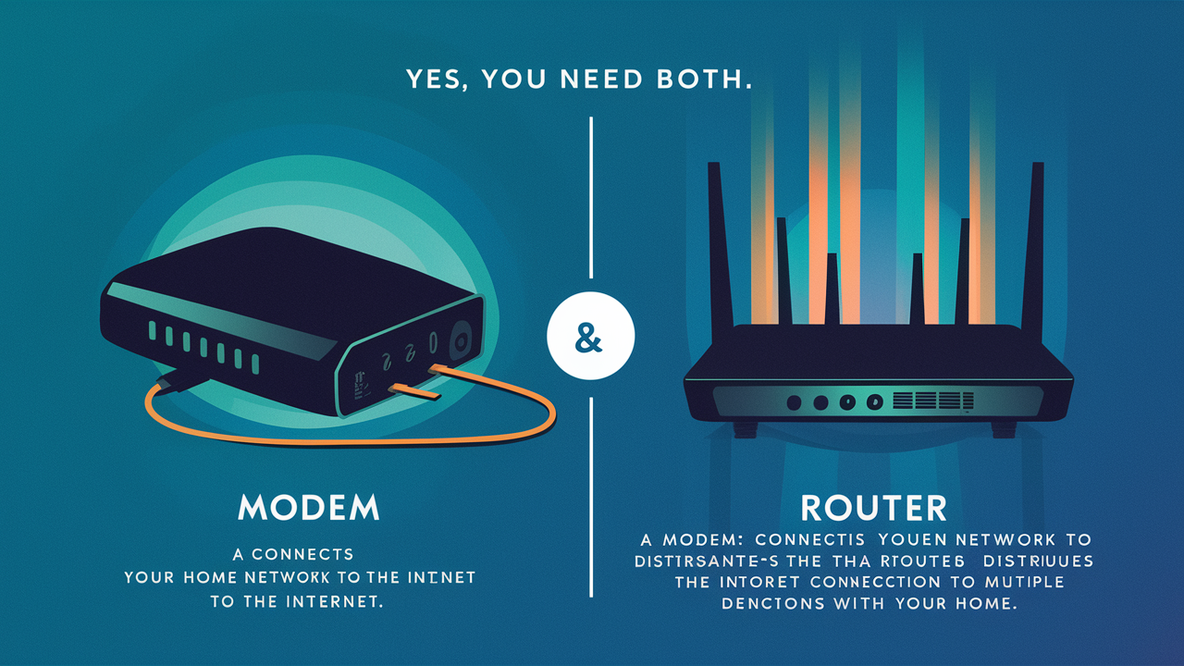
You may not know the differences between a modem and a router and whether you need both or not.
As in the modern world, most households have some form of internet access that comes with the need for some special devices to be connected to the internet. These two networking devices make this possible, modem and router. Even though the two are very different, they are often confused and even used interchangeably, mostly because modem and router do have one common purpose. Knowing the difference between these two devices or even if you require both in your home will enable you to set up a good home network.
What is a Modem?
A modem is a physical communication device used to facilitate the connection of a computer, router, or any other internet-compliant device to the internet. It translates data in the form that computers recognize to an analog format that can be transferred through cable, DSL, fiber optic, or other types of Internet connection. Converts that analog signal back to digital when it gets to the place it was intended to be.
In essence, the modem is a device that facilitates communication between your provider’s network and your home network. They receive the signal from the Internet Service Provider and demultiplex it for general use by a computer or router. Many internet service providers will provide or rent a modem at the time of subscribing to their internet service. If you have agreed with your ISP, then they may supply you with the modem, or you may buy it yourself.
What Types of Modems Are There?
There are a few different types of modems, differentiated by the type of internet connection they work with:
- Cable modems interface with coaxial cables to connect to Internet service offered by a cable company. It is an often-used plan for broadband residential Internet usage.
- DSL modems are similar to their cable modem counterparts in that they access the internet through telephone lines employing DSL technology offered by telecommunications firms. DSL is the abbreviation of ‘digital subscriber line.’
- Fiber modems attach to fiber optic internet lines and act to interpret light signals that are communicated through fiber optic cables. Still, fiber internet can be even faster than cable or DSL, thus being a worthy contender for the top place among internet connections.
- Cellular modems use cellular phone mobile broadband networks of the wireless carriers to transmit and receive mobile Internet. This makes them convenient for devices you wish to use outside the home, but not suitable for always-connected devices where being offline is an anomaly.
What is a Modem, and What Does it Do?
In short, a modem has three essential functions:
1. Provides a link from your ISP to your home by placing a physical connection.
2. Encoding of outgoing digital data to require analog transmission over the Internet infrastructure.
3. Decodes the received analog signals into a form of digital input that is familiar to the computers
This modulation/demodulation process is a source of modem nomenclature, short for modulator/demodulator. This is a very important step in being able to connect to and use the internet; without a modem, it cannot be done.
In simple terms, a router is a device that connects devices on a single network, while a modem is a device that links a network to the Internet.
Again, while a modem builds the actual external link with a network, a router possesses an external network connection and sends it inside your home so that your devices can gain access to the internet. A router establishes your home network, which can be connected wirelessly or through cables. This provides the option of connecting multiple devices such as laptops, tablets, smartphones, media players, home appliances, and computers.
Some key differences between a modem and router include:
- Connection: A modem communicates with the ISP and a router does not have direct communication with the ISP even though it is connected to the modem. It connects to the modem to act as the central point to all the computer networks both in the home and office setting.
- Network: A router connects multiple devices in a home and brings the internet connection to a single local area network (LAN). This is something that a modem cannot accomplish especially without linking it to a router.
- Wired/Wireless Access: Routers enable not only the wired connection but also Wireless Fidelity or WiFi connection to your network. Although modems can be obtained in wireless form, they do not allow wireless access.
- Number of Connections: A router allows several devices to connect to a single internet connection, but most modems enable only one device to connect.
- Advanced Functions: Routers perform other tasks of networking like security, QoS, firewall, and several others. These functions are not available in a modem by itself.
To summarize, you need both a modem and a router to have a fully functional home network:
- The modem ensures that the residential link to the ISP network is established.
- The router is the device that forms your home network and distributes the Internet connection received from the modem to all devices.
For which scenarios may you have to buy your router?
In many cases, yes. When subscribers choose to be connected through residential Internet services, the main ISPs will give them a pre-configured modem/router device. Nevertheless, this particular unit may have only basic router capabilities at its best. Separate routers and indeed mesh router systems, tend to offer higher speeds, broader home coverage, stronger signals, and extra capabilities.
As you transition to owning a separate router, there is so much flexibility and authority regarding your home Wi-Fi network. This ranges from basic Wi-Fi routers, to mesh routers with range-boosting capabilities, to tri-band gaming routers with numerous different options. As much as it is still cheaper to get your router, you have a variety that depends on size, layout, technological activities, and number of people. It also facilitates easy change of ISPs since you can continue using the same router after changing your service provider.
Points to Consider While Choosing a Router
The average customer considering purchasing a router is immediately overwhelmed by the vast number of options available to him on the market with vastly differing prices and features. Keep these factors in mind when shopping for a router:
- Speed – This is beneficial as it would involve enhanced speeds in dealing with network operations of many units. When considering routers, ensure that you select ones that have processors that are not below dual-core 1GHz.
- Wireless Standards – Make sure you purchase a router having newer standards such as 802.11ac Wi-Fi or Wi-Fi 6 and not older ones like 802.11n or older.
- Frequency Bands – Although many routers today can only support a single frequency, having a dual or even tri-band router allows for networks to occupy different bands, causing less interference and congestion.
- Range and Coverage – The greater number of antennas and boosted signal will determine how far Wi-Fi can span in your home. Mesh routers do this best, since each router forms its connection with the internet service provider, while the other routers in the system act as repeaters.
- Number of Ports – Since wired devices do not require a switch, make sure that the router has enough ports to support all your needs.
- Additional Settings – Such extra settings provide guest access, parental controls, Quality of Service, VPN, firewalls, and antivirus that might be required.
- Ease of use – Several features mean that managing a network and solving problems becomes much easier thanks to an application.
- Just as is the case when deciding if one needs a smartphone or not, there may be times when one will not require both devices.
- To summarize the answer – yes, you need both a modem and a router for multiple household devices to connect to your ISP and access the internet:
- A modem offers an outside network connection from your ISP to your home or building. This is the first link in the chain and it is all important.
- A router is connected to a modem creates a local home network and manages distributed internet connection to all devices either wirelessly or through sockets.
- Most ISPs offer a basic modem/router combo as the default offering; however, purchasing a standalone router will enable faster internet speed, better coverage, and full control over your network.
While each serves a different function, using a modem and a router means that there is a path or an opening through which your home becomes interconnected in a way that allows for access to the internet. By distinguishing between the two, you are certain to make the appropriate decision on which hardware to invest in for the creation of an efficient home networking environment that you desire.






